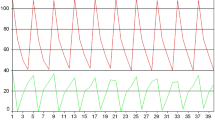Abstract
We consider uncoupled dynamics (each player knows only his own payoff function) that reach outcomes that are Pareto efficient and individually rational. We show that in the worst case the number of periods it takes to reach these outcomes must be exponential in the number of players and hence the same number of periods it takes to reach Nash equilibria. For social welfare maximizing outcomes we provide a tight bound on the minimal number of steps required for reaching such an outcome by uncoupled dynamics.
Similar content being viewed by others
Notes
We say that the bound \(f(n)\le g(n) \le h(n)\) on \(g(n)\) is tight if \(\underset{n \rightarrow \infty }{\lim } \frac{f(n)}{h(n)}=1\).
”Reach” is synonymous for ”play” in game theory and for ”know” in communication complexity. We mean it in the latter sense (but, as we will see later, it does not really matter).
Throughout the paper \(\delta \) will denote the Dirac measure.
We assume, without loss of generality, that \(n\) is even.
The ”first one” is well defined because the set of \(PIR\) distributions is closed.
References
Arieli I, Babichenko Y (2011) Average testing and the efficient boundary. Discussion Paper 567, Center for the Study of Rationality, Hebrew University.
Conitzer V, Sandholm T (2004) Communication complexity as a lower bound for learning in games. In: Brody CE (ed.) Machine Learning, Proceedings of the Twenty-First International Conference (ICML 2004), Banff, July 2004, ACM, New York, pp 185-192.
Hart S, Mas Colell A (2003) Uncoupled dynamics do not lead to Nash equilibrium. Am Econ Rev 93:1830–1836
Hart S, Mas Colell A (2006) Stochastic uncoupled dynamics and Nash equilibrium. Games Econ Behav 57:286–303
Hart S, Mansour Y (2010) How long to equilibrium? The communication complexity of uncoupled equilibrium procedures. Games Econ Behav 69:107–126
Kushilevitz E, Nisan N (1997) Communication complexity. Cambridge University Press, Cambridge
Marden JR, Young HP, Pao LY (2011) Achieving Pareto optimality through distributed learning, Economics series working papers, 557. University of Oxford, Oxford
Pradelski B, Young HP (2010) Efficiency and equilibrium in trial and error learning, Economics series working papers, 480. University of Oxford, Oxford
Saari DG, Simon CP (1978) Effective price mechanisms. Econometrica 46:1097–1125
Acknowledgments
This work is part of the author’s Ph.D. thesis. The author wishes to thank his supervisor Sergiu Hart for his support and guidance and Noam Nisan for useful discussion. This research was partially supported by ERC Grant 0307950, and by ISF Grant 0397679.
Author information
Authors and Affiliations
Corresponding author
Rights and permissions
About this article
Cite this article
Babichenko, Y. How long to Pareto efficiency?. Int J Game Theory 43, 13–24 (2014). https://doi.org/10.1007/s00182-013-0365-y
Received:
Accepted:
Published:
Issue Date:
DOI: https://doi.org/10.1007/s00182-013-0365-y




